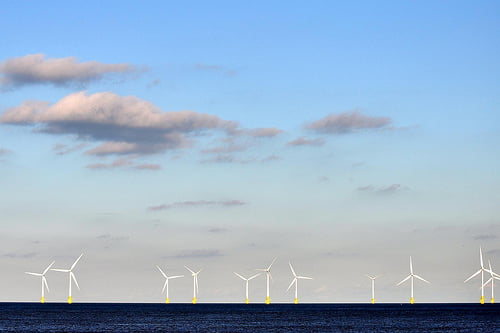

Economy
Report forecasts big economic rewards from UK offshore wind investment
A new report examining the economic impact of planned investment in the UK’s offshore wind sector highlights the massive rewards the industry could bring in today’s difficult economic times.
The Centre for Economics & Business Research (CEBR) study – commissioned by renewables developer Mainstream Renewable Power, whose proposed projects include a 450 megawatt offshore wind farm in the outer Firth of Forth – forecasts the impact on the UK economy by modelling alternative realisations of offshore wind capacity.
The latest report builds on the work done by the Offshore Valuation Group in 2010, which measured the value of the UK’s offshore renewable energy resource.
Under the current investment plan, estimates show that the sector will be expected to increase UK GDP by 0.2% and create 45,000 offshore wind jobs by 2015. By 2020, the GDP contribution will be boosted to 0.4%, and the number of people employed to 97,000. And by 2030, in addition to adding 0.6% GDP growth and creating 173,000 jobs, the sector will deliver an increase in net exports by £18.8 billion – enough to fill 75% of the UK’s current balance of trade deficit.
However, the scenario-based CEBR study argues that a more aggressive – but achievable – approach to investing in the sector could see an annual 1% rise to GDP, the creation of 215,000 jobs and an increase in net exports of £22.5 billion by 2030. This ‘accelerated growth’ scenario would be enough to wipe out almost all of the UK’s current trade gap.
CEBR analysis shows even greater impacts given current global economic circumstances, concluding that in 2020 and 2030, net exports and creation of employment will be larger due to an eventual declining reliance on imports and growth in the export capabilities of the UK offshore wind supply chain as it matures.
This is because the UK would be taking direct actions to stimulate growth in a new industry, unlike in most other European economies which are currently struggling to adjust to the competitive challenge placed on them by newly industrialising economies like China.
Eddie O’Connor, chief executive of Mainstream Renewable Power, said the report’s findings and various conclusions were “truly significant”.
He added: “By helping the UK reduce fossil fuel imports, and by creating a new industry, offshore wind will create jobs, assist in balancing the trade deficit and boost GDP at a time of economic uncertainty.
“We have embarked on a once off transition to a sustainable economy. All forms of renewable energy, from solar energy to tidal energy, will contribute to delivering this transition in the UK.”
Perhaps the latest findings can help shift policy discussion away from the economic costs towards the economic benefits of renewable energy – and prevent the UK government from being locked-in to another round of discussion on nuclear power, which some critics have raised concerns over in response to the UK government’s draft energy bill.
Not only will increased investment in the offshore wind sector help in the global effort to combat climate change, but it will provide affordable electricity to consumers, create jobs and create a sustainable energy economy for the UK in the long-term.
Offshore wind energy is a valuable part of the UK’s energy mix, as is tidal, wave and solar power. And investment into developing these technologies up to the commercial scale application must continue to be supported by a committed UK government today so that the sustainable potential of renewables can be realised in the future.
Further reading:
UK renewable energy generation 2010-2011: infographic analysis
UK energy suppliers’ fuel mix: infographic analysis
Wind partnership for UK and Denmark


 Environment11 months ago
Environment11 months agoAre Polymer Banknotes: an Eco-Friendly Trend or a Groundswell?

 Features10 months ago
Features10 months agoEco-Friendly Cryptocurrencies: Sustainable Investment Choices

 Features12 months ago
Features12 months agoEco-Friendly Crypto Traders Must Find the Right Exchange

 Energy11 months ago
Energy11 months agoThe Growing Role of Solar Panels in Ireland’s Energy Future



























